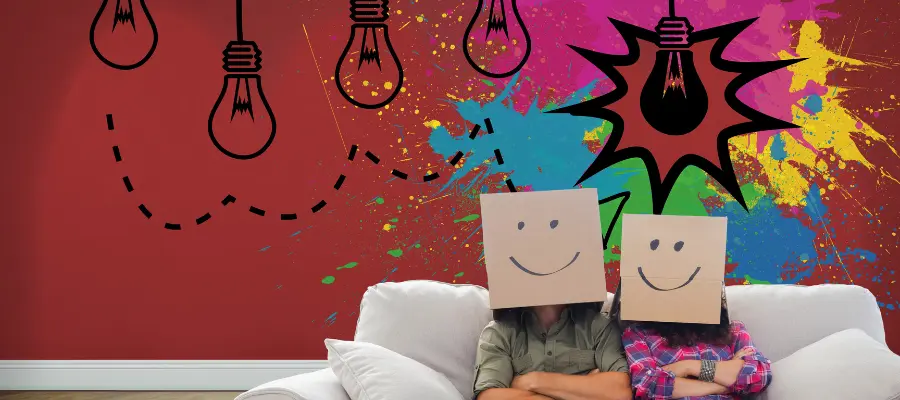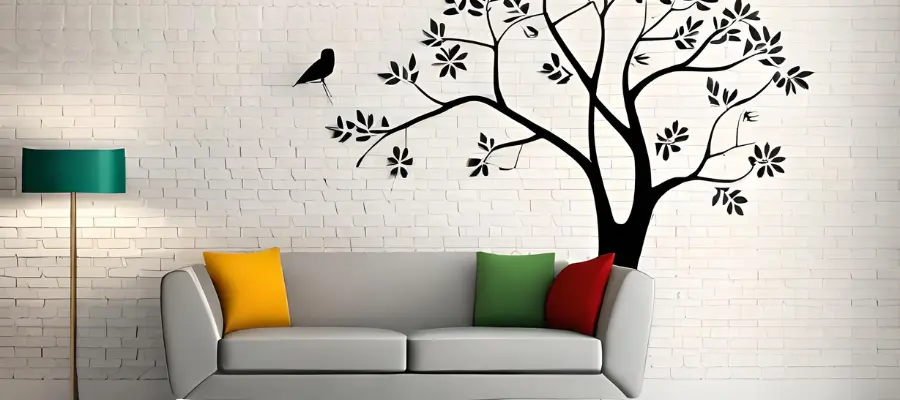Regardless of home size, everyone wants their house to look attractive and pleasing. To this end, people will try to increase their aesthetic appearance with decorative items.
There are many choices for decorating walls. Two popular options are wallpaper and wall decals. Both can change how a room looks, but they are different and work better for some situations than others.
In today’s Brick & Bolt blog, we will discuss the different types and the comparison between wallpaper and wall decals to help you decide which is right for your home.
Wallpaper
Wallpaper, a versatile and traditional wall covering that comes in rolls and is applied using adhesive, has the power to transform entire walls with its myriad of patterns, textures, and colours, inspiring endless design possibilities.
Advantages of Wallpaper
- Wallpapers come in many different designs, patterns and textures. You can choose the ones you like.
- Wallpaper makes plain walls look nice and interesting.
- Good quality wallpaper lasts a long time without getting damaged easily.
- Wallpaper can cover up small cracks or bumps on walls.
- Nicely chosen wallpaper can increase the value of a property.
Disadvantages of Wallpaper
- Putting up wallpaper takes a lot of work – preparing the walls, measuring, cutting and applying it.
- Removing old wallpaper is very difficult and can damage walls.
- Wallpaper is best for dry rooms, not bathrooms or kitchens with moisture.
- While some wallpapers are cheap, high-quality ones can be expensive.
- Wallpaper styles can go out of fashion, so you may need to change them to follow new trends.
Different Types of Wallpaper

1. Liner Wallpaper(Lining Paper)
Liner wallpaper was are also called Lining papers. They are made from paper or fibreglass. It helps hide wall flaws and reduces the need for repairs. You can use it as a base for fancy wallpaper or on its own, and you can even paint it. It’s also easy to put up and take down.
2. Printed Wallpaper
This is a common type of wallpaper available in many colours and patterns. It’s cheaper than handmade wallpaper but can tear easily. The water-based ink makes it unsuitable for kitchens and bathrooms.
3. Vinyl Wallpaper
This has a printed paper base coated with vinyl, making it durable. Thicker vinyl coatings make it stronger. It’s great for kitchens and bathrooms since it can handle steam and is easy to clean.
4. Foil Wallpaper
This creates a shiny, metallic effect using polished metal foil. It highlights wall flaws due to its reflectiveness, so preparing the walls properly is important.
5. Flock Wallpaper
This has a velvety, raised pattern made from fibre printed on paper. It’s more expensive and delicate, best for rooms with little activity.
6. Mylar Wallpaper
Made with a polyester film layer, it has a shiny, foil-like appearance. Wall preparation is needed, but it can be washed and is easy to remove. Suitable for kitchens and bathrooms.
7. Bamboo Wallpaper
This kind of wallpaper is made by hand from real bamboo and stuck onto paper. Each roll may vary in colour because it’s natural. Care is needed during installation, and it can’t be washed.
It is considered an artistic medium, allowing interior designers to experiment with natural imagery, bold textures, and intricate patterns.
Wall Decals

Wall decals, also called wall stickers, are generally made of vinyl and have an adhesive backing, making them easy to apply and remove. They come in various shapes, sizes, and designs and are often used to create specific images or patterns on a wall. Wall stickers for home decoration have become increasingly popular because of their ease of application.
Advantages of Wall Stickers/Decals:
- Wall decoration stickers are easy to apply because they have a sticky back that you can peel and stick onto the wall.
- They come in many different designs, like pictures or motivational quotes, so you can choose the ones you like.
- You can remove decals and reuse them somewhere else without damaging the wall.
- Decals are cheaper than things like wallpaper or paint for decorating walls.
- Besides walls, you can stick decals onto furniture, mirrors, windows or even laptops.
Disadvantages of Wall Stickers/Decals:
- Wall stickers may not last long because they get worn out over time. The sticky backing can stop sticking after a while.
- Decals may cover a smaller wall area than wallpaper or paint.
- When putting them up, air bubbles can form under the decal, making it look uneven.
- While many decal designs are limited in size, detail, and custom design compared to other options,
- Decals may not stick well to rough or textured wall surfaces.
Different Types of Wall Stickers/Decals
1. Murals
These are perfect wall stickers for home decoration. They are large wall stickers that cover the complete wall. They are usually used for advertising, branding, or providing information in places like museums and schools.
2. Stickers Made of Vinyl
These are made of vinyl material and come in different sizes. Since bigger stickers can stretch and tear with time, smaller ones are better. These are useful at home or in the office for decorating purposes.
3. Traditional Stickers
These self-adhesive wall stickers are made of PVC plastic and cut into different shapes using a single colour. They are printed on vinyl and then cut out. If you only need one colour, then this will be perfect.
4. Block-Cut Vinyl
These can be more colourful and can have different finishes, such as shiny, mirror-like, or sparkly. You can choose any texture you like for these.
5. Fabric Wall Graphic
These self-adhesive wall stickers are made of materials other than PVC and give your walls a fabric-like appearance.
Wallpaper vs Wall Decals
| Wallpaper | Wall decals | |
| Installation | Covers large areas seamlessly, adding texture and depth to a room. | Easy to apply with peel-and-stick backing; allows repositioning until satisfied with the placement. |
| Durability | Highly durable and able to last many years without wear, it hides wall imperfections. However, it is susceptible to damage in high-humidity areas like bathrooms and kitchens. | Wall decal is a temporary decor solution. They resist moisture and are easy to clean, so they work well in humid areas. However, after a while the decals may start peeling off the wall because the sticky backing loses its stickiness over time. |
| Aesthetics | Adds significant visual interest and texture, creating a permanent and polished look. | Wall decals are usually used for adding a few decorative accents, not for decorating an entire room with a single theme. |
| Cost | High initial cost but durable, making it cost-effective in the long run. | Generally less expensive; an affordable way to update decor without significant financial commitment. |
| Ease of Removal | Requires careful removal to avoid damage. | Easy to remove without leaving stains or damage on walls. |
Conclusion
Ultimately, wallpaper and wall decals have merits, and your specific design goals, budget, and the intended use of the space should guide your choice between them. Whether you choose wallpaper or wall decals, both can transform your walls into spaces that showcase your personal style.

